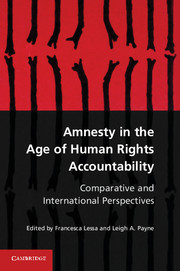Book contents
- Frontmatter
- Contents
- Contributors
- Foreword
- Acknowledgments
- Introduction
- Part I Theoretical Framework
- Part II Comparative Case Studies
- 3 Amnesties’ Challenge to the Global Accountability Norm?
- 4 From Amnesty to Accountability
- 5 Barriers to Justice
- 6 Resistance to Change
- 7 De Facto and De Jure Amnesty Laws
- 8 Creeks of Justice
- 9 Accountability through Conditional Amnesty
- 10 De Facto Amnesty?
- 11 A Limited Amnesty?
- 12 The Spanish Amnesty Law of 1977 in Comparative Perspective
- Conclusion Amnesty in the Age of Accountability
- Bibliography
- Index
- References
11 - A Limited Amnesty?
Insights from Cambodia
Published online by Cambridge University Press: 05 June 2012
- Frontmatter
- Contents
- Contributors
- Foreword
- Acknowledgments
- Introduction
- Part I Theoretical Framework
- Part II Comparative Case Studies
- 3 Amnesties’ Challenge to the Global Accountability Norm?
- 4 From Amnesty to Accountability
- 5 Barriers to Justice
- 6 Resistance to Change
- 7 De Facto and De Jure Amnesty Laws
- 8 Creeks of Justice
- 9 Accountability through Conditional Amnesty
- 10 De Facto Amnesty?
- 11 A Limited Amnesty?
- 12 The Spanish Amnesty Law of 1977 in Comparative Perspective
- Conclusion Amnesty in the Age of Accountability
- Bibliography
- Index
- References
Summary
The Cambodian government passed two successive amnesties in the 1990s in answer to the lingering question of how to respond to the legacy of the Khmer Rouge. That legacy began in 1975 when Pol Pot and his Party of the Democratic Kampuchea, also known as the Khmer Rouge, seized power from the U.S.-backed Cambodian regime led by Lon Nol. In 1975, Cambodia was recovering from a recent civil war, had endured invasion by various neighbors, and been blanketed with over two hundred fifty thousand tons of bombs dropped by the United States in an effort to disrupt the Ho Chi Minh Trail during the Vietnam War. Pol Pot entered Phnom Penh on April 17, 1975, declaring the start of “year zero,” and initiated a brutal campaign to remake Cambodian society. Hundreds of thousands of people were tortured and murdered, and millions more perished as a result of starvation and disease. By the time the Vietnamese invaded and overthrew the Khmer Rouge in 1979, over two million people had died.
While international criminal trials for gross violations of human rights gained popularity in the 1990s as the preferred method for addressing such atrocities (see Kathryn Sikkink’s chapter in this volume), negotiations between the United Nations and the Cambodian government to create a judicial mechanism for holding individuals accountable for similar crimes committed two decades earlier by the Khmer Rouge stalled repeatedly. Until recently, the Cambodian government’s primary official response to those responsible for one of the worst regimes of violence in human history has been the passage of two amnesties. The result has been a consistent official policy of impunity and amnesia. It was only in 2003 (almost thirty years after the removal of the Khmer Rouge) that the government entered into an agreement with the United Nations to establish the Extraordinary Chambers in the Courts of Cambodia (the ECCC, or Tribunal) to prosecute those most responsible for atrocities committed during the Khmer Rouge period. It took another four and a half years for the Tribunal to be established and to adopt its rules of procedure. The Tribunal has been marred with controversy since its inception, including allegations of corruption, political interference, and fundamental disagreements between international and Cambodian prosecutors and other Tribunal personnel. Yet the Tribunal has also convicted Kaing Guek Eav (“Duch”), the commander of the notorious S-21 torture prison, in a trial many observers conclude was fair.
- Type
- Chapter
- Information
- Amnesty in the Age of Human Rights AccountabilityComparative and International Perspectives, pp. 291 - 314Publisher: Cambridge University PressPrint publication year: 2012
References
- 3
- Cited by



